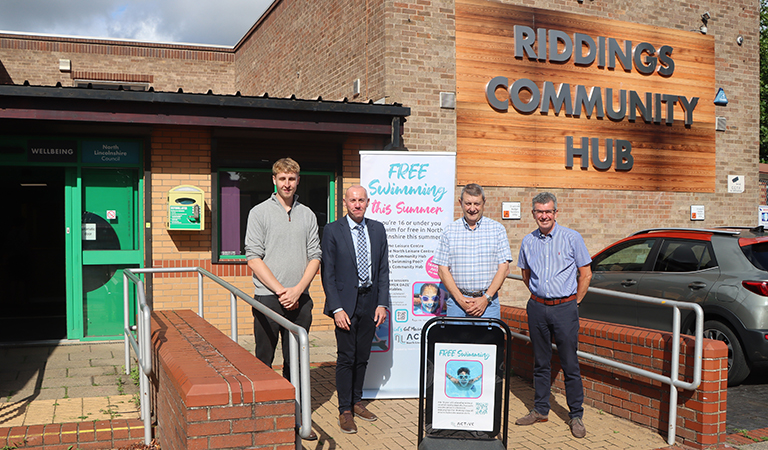Mum’s charity abseil to thank hospital for saving son’s life
Summer perks return for North Lincolnshire’s young people
Children and teenagers in North Lincolnshire can once again enjoy free swimming and cheaper bus fares throughout the school summer holidays.
Single bus tickets for young people aged five to 19 are capped at £1.50, while adults travelling with them pay no more than £3 per single journey. The fare offer applies to all local services, making it easier to visit attractions such as Normanby Hall Country Park, leisure centres, museums and market towns across the region.
Swimming is also free for under-16s at six local pools: The Pods, Riddings Community Hub, Ancholme Leisure Centre, Axholme North Leisure Centre, Baysgarth Community Hub and Epworth Swimming Pool. The free swims, part of the Summer Daze sessions, must be booked in advance for children aged eight to 16.
Children under eight need to be checked in by an adult at reception, and pool safety rules mean the youngest swimmers must be supervised at all times.
The seasonal scheme, which proved popular last year, is designed to give families affordable ways to spend the summer together while encouraging safe swimming and greater use of public transport.
Image credit: North Lincolnshire CouncilLincolnshire hospices share funding to enhance end‑of‑life care
Hospices in Lincolnshire will share more than £780,000 in new funding aimed at improving facilities and services for people receiving end‑of‑life care.
St Barnabas Lincolnshire Hospice in Lincoln has been allocated £709,550, while Butterfly Hospice in Boston will receive £36,645. Beaumond House Hospice Care in Newark, which also serves parts of Lincolnshire, has been awarded £98,556.
The investment is part of a national £75 million programme for the 2025/26 financial year, supporting 170 hospices across England. The funding will go towards refurbishments and upgrades that focus on creating more comfortable spaces for patients and their families, including private rooms, communal areas and landscaped outdoor spaces.
Hospices will also use the funding for improvements such as energy‑efficient facilities, adapted beds, and digital systems that allow smoother coordination with other health services. The upgrades are designed to make end‑of‑life care more personal and accessible in local communities, reducing reliance on hospital settings.
Hospice UK will manage the distribution of the funds, with organisations able to draw from their allocated share as work is completed.
Image credit: Stock.adobe.com/Stockfotos-MGSeaside to be brought to Sleaford
YOPEY Befrienders recognised for connecting generations at Fenchurch House Care Home
Get Ready for the ultimate tribute experience at Rewired Festival 2025!
Free swimming sessions return for summer in North Lincolnshire
Children and families in North Lincolnshire can once again enjoy free swimming throughout the school summer holidays as the council’s Summer Daze programme returns.
The sessions, open to anyone aged 16 and under, run until early September across leisure centres in Barton-upon-Humber, Crowle, Scunthorpe’s The Pods and Riddings pools, Epworth Swimming Pool and the small pool at Ancholme Leisure Centre.
Young swimmers aged between eight and 16 need to book online in advance, while younger children can be registered on arrival. Family sessions are also part of the programme, giving the opportunity for parents and children to swim together free of charge.
More than 6,100 free swims took place last year as part of the initiative, which aims to give children a safe, healthy and low-cost way to spend their summer holidays while encouraging an active lifestyle.
By offering supervised sessions at local leisure centres, the programme provides a safe alternative to swimming in open water and helps support families looking for affordable activities over the summer.
Image credit: North Lincolnshire CouncilFirst phase of redevelopment works get the go-ahead at Castle Sports Centre
Lincoln makes list of best value cities for families
For parents juggling school catchment maps and mortgage calculators, there’s good news: Lincoln has landed a spot on a new list of cities where great schools don’t come with eye-watering house prices.
The study, carried out by University of Technology Sydney Online, looked at more than 130 locations across England to find where families can get the most bang for their buck, balancing quality education with affordable property. The rankings are based on the proportion of schools rated ‘Outstanding’ by Ofsted between January 2024 and January 2025, alongside average house price data from the Office for National Statistics.
Lincoln came in 22nd place overall, with homes averaging £187,000, making it the 12th most affordable location in the study. While the city didn’t score top marks on school quality, with just under 7% of schools rated outstanding, its historic charm and comparatively low property prices still make it a standout choice for families seeking long-term value.
Wigan topped the list thanks to a rare mix: high-performing schools and house prices under £200,000. Preston and Chorley followed closely, with Burnley offering the lowest house prices overall at just £118,000. Luton rounded out the top five.
At the other end of the scale were places like Bath, Brighton and Hove, and parts of Hertfordshire, where house prices are high but outstanding schools are harder to come by. Unsurprisingly, London fell outside the top tier, ranking 72nd, well behind regional cities like Liverpool, which placed 15th.
For families who don’t want to sacrifice either their child’s future or their financial sanity, cities like Lincoln offer a rare middle ground. The perfect school might still take some searching, but it doesn’t have to cost a fortune to live nearby.
Image credit: Stock.adobe.com/U-JINN PhotographyLincolnshire flood alerts get smarter and more targeted
Flood warnings across Lincolnshire have been upgraded to improve accuracy and reach, following several disruptive flood events earlier this year. The Environment Agency has expanded its service to cover hundreds more properties, with a particular focus on areas such as Grantham, Boston, Lincoln and Market Rasen.
The January floods prompted more than 30 warnings in a single period, and highlighted gaps in the existing alert system. Some residents in Grantham, for example, were notified unnecessarily, leading to avoidable concern.
In response, the Environment Agency has introduced more precise alert zones. One key change is the creation of a dedicated warning area for the South Forty-Foot Drain in Boston. In Grantham, the River Witham alert area has been split to better reflect flood risk patterns.
These updates mean over 800 properties have now been placed into a more appropriately sized flood warning zone. Officials are encouraging locals to register for alerts, as better data and targeting means warnings are now more useful and less likely to cause false alarms.
The changes are part of broader efforts to make flood alerts feel less like blanket warnings and more like tailored, timely tools to help people prepare.
Image shows Boston. Credit: Stock.adobe.com/Tony











